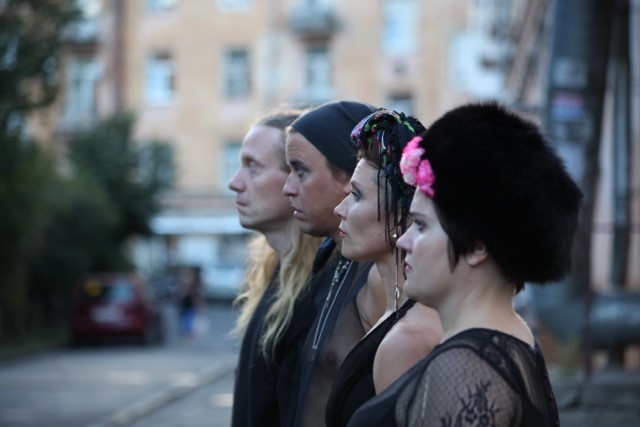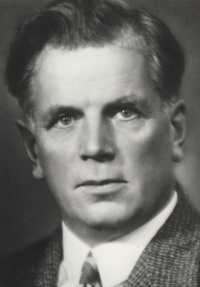
 Suistamon Sähkö started as part of a multi-performance series of works for music, dance and visual arts called Suistamo - The Laboratory of Tradition by Finnish composer and accordionist Anne-Mari Kivimäki. In a number of journeys to the Russian-Finnish border region of Karelia, she explored both the traditions and modern realities of this multi-national territory. Etkot, ресторан ja etnoteknoa (loosely in English, 'Pre-party, restaurant and ethno-techno') marks the band's first fully independent recording, free from the laboratory and open to anything. It's a project rich in contradictions and full of energy (the band's name translates as Suistamo Electricity). I asked Anne-Mari to send me a few words about some of the music, and in the new spirit of the band, she handed those duties off to Eero Grundström (electronics and vocals) and Tuomas Juntunen (vocals), who wrote the lyrics to these compositions. The songs on the album are performed by a quartet that also includes vocalist Reeta-Kaisa Iles. - Cliff Furnald
*
Beauty and dilapidation in Jyskyjärvi by Tuomas Juntunen We have travelled several times to Karelia during the last years. The area of Suistamo and Jyskyjärvi are full of places that are both breathtakingly beautiful and dilapidated, where you can sense the lived life. Lifestyle from decades ago and hospitable people leave the longing sense in the soul of a visitor that you want to come back. We have experienced that; each trip we take to Karelia has carried Suistamon Sähkö long time after the travel. Our connection to the people, the amazingly beautiful nature and the buildings that have worn out can be heard in the song "Jyskyjärven kautta / Via Jyskyjärvi."
 Tampere Finland, 1918 How a folk dance project tune evolved into rap song about Finnish civil war and the dangers of hate speech by Eero Grundström
"Let's dance, not make war. Let's not repeat the history." This year is 100th anniversary of the Finnish civil war and more I dug into early days of independent Finland more I got worried that a new civil war is not just distant dystopia but a possible worst case outcome of political trends in Europe (and US) in 2018. Growing political polarization and the new rise of old fascistic ideas has already led to growing political violence. Be careful what you sing about, you may just get it. That’s what happened in Finland 100 years ago. Both patriotic and revolutionary songs were full of war rhetoric, dehumanizing of “the enemy.” violent fantasies, and pure hate. And that’s exactly what we got: a bloody, messy civil war full of arbitrary war crimes which were often committed by groups of men getting drunk and executing random prisoners just to prove their toughness or just “for the lulz”. Hate speech and toxic masculinity, anyone? Suistamon Sähkö made music for a big folk dance project in Tampere, Finland in 2018. It was mostly traditional stuff, dances that were popular 100 years ago, but also some new music. We were asked to use the tune “Kerenski” as a zeitgeist and kind of theme tune.
"Kerenski" was a very popular dance tune around Europe but was also used with right-wing propaganda lyrics in Finland 100 years ago . That propaganda version was later adopted by neo-Nazis, which made for some head-scratching on how the heck we could make use of this tune. But we found our way, and actually ended up using the "Kerenski" theme twice: as a bouncy party tune that later evolved to “Silkkiä vaan” (which also has traditional party lyrics), and as a more distant reference and the basis for a new composition in “Tampere-18” that was the grande finale of the show with 800 dancers.
Because the dance project had some historical aspects, I thought it would be great have a small history lesson on how we got into civil war in 1918 but still could manage to continue as a nation. I considered myself a bit too leftist to write it myself without bias, so I asked Tuomas to write some rap lyrics with a conciliatory tone. He did great job and the lyrics combined with Anne-Mari’s trancey Notka [accordion] riffs, and a wordless chorus that was so melancholy and uplifting at the same time it made us think that we should put this one to record.
So we did one version but I didn’t feel it was complete yet. The history section was not enough; we needed to sing about what’s happening right now, so I added more text and two more rappers, still keeping the history lesson by Tuomas in the middle. I wanted to remind the listener that we should not tolerate private militant guards on the streets. We can totally disagree on how the society should be organized, and still live and let live.
And the civil war, are we really over it? We were fully capable to commit most horrible war crimes back then, and we still are. We had concentration camps. We should talk more of it, see and admit all the traumas and taboos it caused. It can happen again. They were ordinary people, it all started with hate speech. And also, there’s forces that are purposefully putting poor people against each other. Don’t be fooled by this divide and rule strategy. We need to re-invent the hope, not believe today's propaganda that it’s all about competition, fighting, dropping others out.
There is also some interesting instrumentation in the beats section. Drums and bass are played with a Knifonium, a unique Finnish tube synthesizer built by Jonte Knif. Some loops are done by taping contact mics to my knees, then tapping and scratching some Karelian D’n’B rhythms. Kantele chords were processed almost beyond recognition with a Eurorack wavefolder and low pass gate modules. Also some of delay stuff is hand made with a modular synth. On the brighter side of spectrum there’s some arpeggios from an 0-Coast synthesizer. In this album there’s lots of analogue synth soundscapes and some electro-acoustic experimental stuff, like using DC motors as part of the rhythm section. Kind of a combination of steam punk spirit and more modern electropop production techniques. Traditional Karelian rhythms and electronic music tradition have surprisingly much common ground.
This recording was released by the artists in Finland on Kihtinäjärvi Records. It is also available in other parts of Europe and the world from Nordic Notes.
|






 “Tampere-18” has an intro section called “Tora,” containing snippets of speech by Yrjö Kallinen (pictured here), a man who saw the civil war, a social democrat who was against idea of violent revolution in 1918. He survived despite cheating death three times in prisoner camps. He was a well-known pacifist who ended up being Finland’s minister of defense after WW2. So he knows what he’s talking about.
“Tampere-18” has an intro section called “Tora,” containing snippets of speech by Yrjö Kallinen (pictured here), a man who saw the civil war, a social democrat who was against idea of violent revolution in 1918. He survived despite cheating death three times in prisoner camps. He was a well-known pacifist who ended up being Finland’s minister of defense after WW2. So he knows what he’s talking about.
